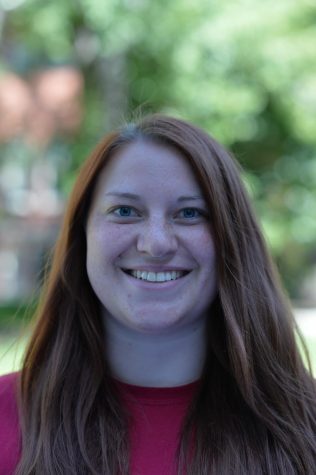Advocate works to empower everyone
After moving for grad school, Murray finds work supporting marginalized people
June 26, 2019
Nearly a decade ago, Jennifer Evan Tess Murray moved from Maine to Pullman for graduate school to study sociology. Murray, now 41, has worked as a program coordinator at the WSU Women*s Center for over three years.
Murray, who identifies as a genderqueer lesbian and uses they/them/their pronouns, never completed graduate school at WSU studying sociology, but they were convinced they still had a lot to give to the world.
Before working at WSU, they worked at Alternatives to Violence on the Palouse as the coordinator of sexual assault services for a year and half.
Now, Murray is preparing to move back to Maine on July 1.
“I’ve found family here and it is incredibly hard to leave,” Murray said. “If I didn’t have family there, pulling me in both directions, I don’t know if I could leave.”
During their time at ATVP, Murray worked directly with sexual assault survivors, police, prosecutors and medical professionals, and oversaw a team of people who worked with survivors.
As a survivor and an advocate, Murray said they never told people what to do but informed survivors of their options.
After switching jobs to work at the Women*s Center, Murray said their training at ATVP was invaluable in helping them talk with and represent the interests of people who have experienced trauma.
“My assumption is that every person is an expert in their own life, and I’m not living it,” Murray said. “I can’t make their decisions better than they could.”
Kayley DeLong, a program assistant at the Academic Success and Career Center, met Murray when DeLong transferred to WSU. Before graduating in 2018, DeLong worked as an intern and a program assistant at the Women*s Center before the ASCC.
“I really grew into myself and grew into my professional space, and [Murray was] a part of that,” DeLong said.
Women*s Center Director Amy Sharp said Murray is good at listening to and understanding people and said their experience at ATVP has improved service at the Women*s Center.
Murray said they enjoy empowering people who visit the center. Not everyone is aware of their own strengths, they said.
Sharp said Murray helped her grow as the director through their advocate experience and connections in the community.
The Women*s Center is closely allied with the Gender Identity/Expression and Sexual Orientation Resource Center, and Murray has worked to make sure the Women*s Center is gender inclusive.
“We don’t just include people because it’s the right thing to do — we also want to include people because it makes us as a society better for everybody,” Murray said.
Murray said speech habits and labels like “women and men” when talking about people can exclude those who do not identify strictly with male or female gender identities. Making small changes in word choice is an easy way to help others to feel more comfortable and accepted, Murray said.
Murray added their pronouns to their email signature, and while some people make mistakes, they are not deliberately disrespectful, Murray said. That isn’t true for all places.
Ignorance about a person’s gender identity or sexuality could, in some cases, also impact someone’s physical well-being, they said.
Murray said that as a lesbian, doctors are not always well-informed on their health care needs. They were once told by a doctor that they did not need STI/STD tests because “women couldn’t infect other women with any kind of STI.”
“I don’t like feeling like I have to educate my own doctors on the subject of my own healthcare,” Murray said.
Medical professionals sometimes ask the wrong questions, Murray said, like if they use condoms when they have relations with a cisgender woman.
Murray is leaving for Maine soon and has focused their energy on moving. They will be staying with family around the state until they find a job, and said they hope to continue doing work that will make people’s lives better.
“I want folks at WSU to know I am by far not the only person on this campus trying to make life a little bit easier or better for marginalized folks,” Murray said.









